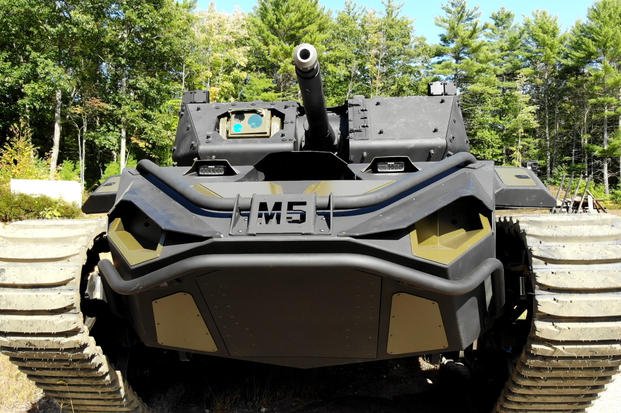
Officials laid out a plan Tuesday to test Army Robotic Combat Vehicle prototypes over the next 17 months, leading up to a soldier evaluation at Fort Hood, Texas.
The Army has taken possession of the first four working prototypes of the Robotic Combat Vehicle-Light, or RCV-L, and expects to receive the first four prototypes of the RCV-Medium, or RCV-M, in April and May.
“They can go into the dirtiest, nastiest places on Earth and relieve the risk on our soldiers,” Maj. Gen. Ross Coffman, head of Army’s Next Generation Combat Vehicle Cross Functional Team, told an audience Tuesday at the Association of the United States Army’s Global Force Next symposium.
Read Next: Army Chief Hints at New Training Center in Alaska While Unveiling New Arctic Strategy
The Army announced in early 2020 that it had tapped QinetiQ North America to build four RCV-Ls and a team from Textron, Howe & Howe Technologies and FLIR Systems Inc. to build four RCV-Ms.
The RCV-L has a gross weight of 8,500 pounds and is equipped with a diesel-electric hybrid engine capable of 40 miles per hour, said Alfred Grein, acting director of the Ground Vehicles Systems Center at the Army Combat Capabilities Development Command. The RCV-M is also a diesel-electric hybrid with a gross weight of 25,000 pounds; it is equipped with a remote-operated 30mm cannon and has a top speed of about 25 miles per hour.
Both models will be equipped with government-developed autonomous software and undergo “shakedown testing” at Camp Grayling, Michigan, beginning this spring and running through September, Grein said.
In November, the vehicles will shift to the Army Test and Evaluation Command for safety testing, which is scheduled to conclude in May 2022, he added.
The vehicles will then be prepared to operate in manned-unmanned teaming, or MUMT, scenarios, which will involve the RCV-Ls; RCV-Ms; four RCV-Heavy surrogates fashioned from M113 personnel carriers; and six mission enabling technology demonstrator, or METD, vehicles.
Last year, the Army conducted a test at Fort Carson, Colorado, using modified Bradley fighting vehicles serving as METD vehicles to control four M113 surrogate RCV-Hs.
In June 2022, the service is scheduled to begin the Soldier Operational Experiment at Hood, in which soldiers will train with the RCV prototypes in situational and live-fire scenarios that will conclude in August of that year, Grein said.
The results of the testing will be used to help the Army decide how to proceed with the RCV effort in 2023, officials said.
“We know that these events are going to definitely help shape the future for Army robotic systems and the requirements and meet those capability needs,” Grein said.
Source: Military News



